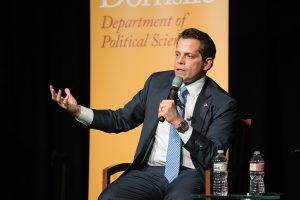Anthony Scaramucci speaks at Unruh event

Ling Luo | Daily Trojan
Talking politics · Anthony Scaramucci, former communications director for the Trump White House, spoke at the Unruh Institute of Politics Tuesday.
He was joined by Unruh Institute of Politics Director Robert Shrum to discuss the current state of American politics, his experience on President Donald Trump’s 2016 campaign, his political views and his latest comments on the White House staff’s morale.
Scaramucci, commonly referred to as “the Mooch,” formerly served as Trump’s communications director and worked as a financier and entrepreneur before entering politics.
Shrum started the conversation on a humorous note, mentioning Scaramucci’s brief 10-day stint as communications director.
“I empathize with you because I worked with Jimmy Carter for 10 days,” Shrum said.
Scaramucci jokingly disagreed and noted that it would be 11 days, if a person bothered counting the days with their hands. But he acknowledged that after entering the role, he realized it wasn’t suitable for his honest personality. The pressure dawned on him after his first press conference.
In his self-introduction to the audience, Scaramucci spoke about his childhood in a blue-collar town, and his disengagement from the working class as he climbed the professional ladder after attending Harvard Law School and working at Goldman Sachs.
His experience on the Trump campaign allowed him to reconnect with working class people and understand what was important to them.
“It was like a wake-up call,” Scaramucci said. “What was being said to me was desperational. What was being said to me was about economic loss, factories closing down … Once I did 26 Donald Trump rallies and two Bernie Sanders rallies, then it dawned on me that [Trump] had a good shot to win.”
Shrum brought up how Scaramucci recently made headlines last week regarding his comments about the White House staff and their declining morale under the leadership of General John Kelly, Trump’s chief of staff. He predicted that more staff would leave following the departure of Hope Hicks, Trump’s latest communications director.
“I said those things publicly because it’s so obvious — it’s the secret that’s not so secret,” he said. “You’re being underserved by your government, so we have to fix it … I’m talking about [Kelly’s] operational style of management. And if he’s not going to change it, then we have to make a change.”
Scaramucci openly criticized both the Democratic and Republican parties for the “establishment” behavior in Washington and Congress’ inability to pass significant legislation on issues the American people care about.
“All my Republican friends are going to be mad at me,” Scaramucci said, addressing the Republican party’s failure to pass health care reform. “They voted 268 times — repeal and replace, repeal and replace — they had seven and a half years to come up with a healthcare plan.”
However, Scaramucci acknowledged that he holds fiscally conservative yet socially inclusive views and praised certain aspects of the Republican tax plan, like the corporate tax cut. Though he no longer works for Trump, Scaramucci constantly emphasized his respect for the president and partially attributes the administration’s inaction to the deadlock in Congress.
“I think he’s very human,” Scaramucci said, when asked about Trump’s perceived lack of empathy toward the Parkland, Fla. shooting survivors. “He’s in the room with people who might not like him; he’s in the room with people who have different views on gun control … The guy is not the ogre and the two-dimensional person they make him out to be.”
Yet, he noted how Trump also has shortcomings the president should address, such as his vocal criticism of the media and his failure to denounce the violent actions of white nationalists in Charlottesville, Va.
His remarks led to questions about whether he ever planned to run for office, which he admitted would be impossible for him as a Republican in New York, an overwhelmingly blue state.
But some students, like Stephanie Corrigan, a junior majoring in political science, thought otherwise of Scaramucci’s persona.
“I felt like he was very much the quintessential politician, like he knew how to work the crowd,” Corrigan said. “He was able to be funny and make people laugh, which definitely seemed to work in his favor. I wouldn’t be surprised if he ultimately ended up running for something.”
To conclude the discussion, Scaramucci ended with a sentiment of inclusion and progress.
“We have to create social progress, so we have to call each other out and make each other aware of these issues, and make sure that each of us know that whatever our skin color, our sexual orientation, our religious orientation — that we’re all the same,” he said. “We want the same things and we’re all good people.”
